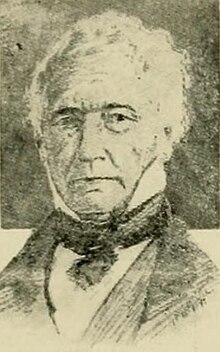Our website is made possible by displaying online advertisements to our visitors.
Please consider supporting us by disabling your ad blocker.
John Scott (Missouri politician)
This article includes a list of general references, but it lacks sufficient corresponding inline citations. (February 2013) |
John Scott | |
|---|---|
 | |
| Member of the U.S. House of Representatives from Missouri's at-large district | |
| In office August 10, 1821 – March 3, 1827 | |
| Preceded by | Himself (Delegate) |
| Succeeded by | Edward Bates |
| Delegate to the U.S. House of Representatives from the Missouri Territory's at-large district | |
| In office August 4, 1817 – March 3, 1821 | |
| Preceded by | Himself |
| Succeeded by | Himself (Representative) |
| In office August 6, 1816 – January 13, 1817 | |
| Preceded by | Rufus Easton |
| Succeeded by | Himself |
| Personal details | |
| Born | May 18, 1782 Hanover County, Virginia, U.S. |
| Died | October 1, 1861 (aged 79) Ste. Genevieve, Missouri, U.S. |
| Political party | Democratic-Republican (Before 1824) National Republican (1824–1834) |
| Education | Princeton University (BA) |
John Scott (May 18, 1782 – October 1, 1861) was a Delegate and a U.S. Representative from Missouri.
Born in Hanover County, Virginia in 1782,[1] Scott moved with his parents to Indiana Territory in 1802. He was graduated from Princeton College in 1805. He studied law. He was admitted to the bar and commenced practice in Ste. Genevieve, Missouri, in 1806. He owned slaves.[2] He presented credentials as a Delegate-elect to the Fourteenth Congress from the Territory of Missouri and served from August 6, 1816 to January 13, 1817, when the election was declared illegal and the seat vacant.
Scott was elected as a Delegate to the Fifteenth and Sixteenth Congresses and served from August 4, 1817, to March 3, 1821. Upon the admission of Missouri as a State into the Union, Scott was elected as a Democratic-Republican to the Seventeenth Congress, reelected as an Adams-Clay Republican to the Eighteenth Congress, and elected as an Adams candidate to the Nineteenth Congress and served from August 10, 1821, to March 3, 1827. He served as chairman of the Committee on Public Lands (Nineteenth Congress). He was an unsuccessful candidate for reelection in 1826 to the Twentieth Congress. He resumed the practice of law. He died in Ste. Genevieve on October 1, 1861.
- ^ Lives of Eminent Missourians
- ^ "Congress slaveowners", The Washington Post, January 19, 2022, retrieved July 10, 2022
Previous Page Next Page


